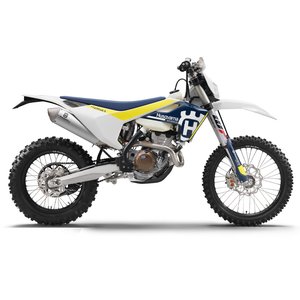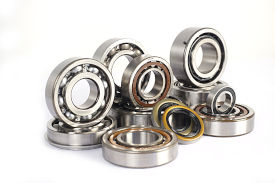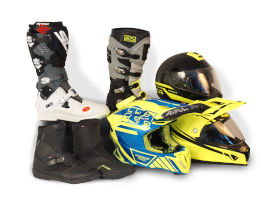Husqvarna FE 350 [2019-2020]: The Sweet Spot Between Agility and Power
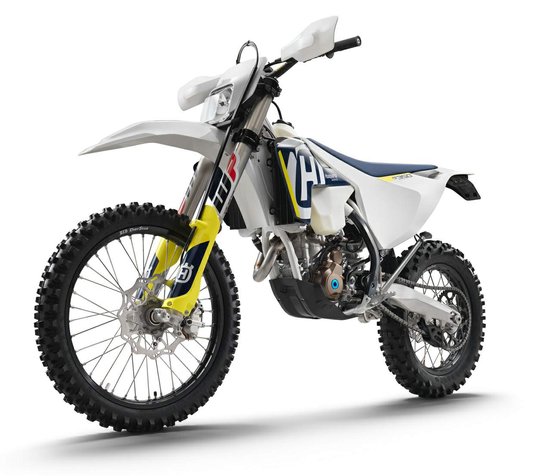
Introduction
The Husqvarna FE 350 isn’t just a motorcycle—it’s a declaration of intent. Designed for riders who refuse to compromise between lightweight agility and raw power, this enduro machine carves its identity in the dirt, rocks, and trails where other bikes hesitate. Built around a philosophy of "450 performance in a 250-sized package," the FE 350 generation from 2019–2020 represents a high-water mark for riders seeking versatility in technical terrain and open trails alike. Let’s dissect why this bike continues to turn heads and dominate wish lists.
Riding Experience: Where Physics Meets Finesse
Engine: The Goldilocks Zone
At the heart of the FE 350 is its 349.7 cc DOHC single-cylinder engine, producing 45 hp (32.8 kW) with a torque curve that feels like it was drawn by a mathematician obsessed with perfection. Unlike peaky 250s or lumbering 450s, this powerplant thrives in the middle ground. Crack the throttle, and the Keihin fuel injection delivers linear, predictable power—no hiccups, no surprises. The magic lies in its ability to chug up rocky inclines at low RPMs without stalling, then scream into the high revs with a ferocity that’ll have you forgetting it’s "only" a 350.
The 2020 model’s revised 13.5:1 compression ratio (up from 12.3:1) sharpens throttle response, while the DDS clutch and Magura hydraulics ensure featherlight lever action, even after hours of abuse. And yes, the electric start always feels like a luxury when you’re halfway up a muddy hillside.
Chassis: A Ballet Dancer in Steel
Husqvarna’s 25CrMo4 steel frame is a masterclass in mass centralization. Weighing just 109.2 kg (240.7 lbs) dry in 2019 and dropping to 106.8 kg (235.4 lbs) in 2020, the FE 350 dances beneath you. The 2020 update introduced a laser-cut, robot-welded frame with increased torsional rigidity, translating to sharper feedback when carving through switchbacks.
The ergonomics? Think tailored suit. The 2020 model’s seat height drops to 950 mm (37.4 in), making it more accessible without sacrificing ground clearance (360 mm / 14.1 in). Narrow bodywork lets you grip the bike with your knees like a trials rider, while the composite carbon fiber subframe (saving 250 g) absorbs hits without flexing.
Suspension: WP’s Off-Road Masterstroke
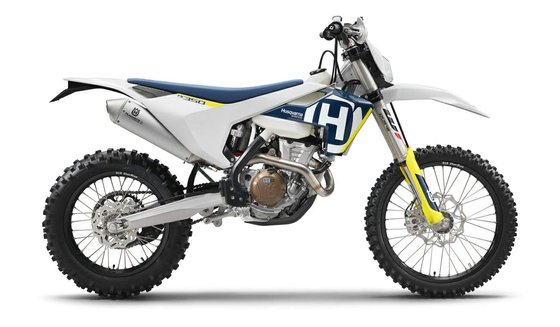
The 48 mm WP Xplor fork (300 mm / 11.8 in travel) and WP XACT shock (300 mm / 11.8 in rear travel in 2020) are the unsung heroes. Preload adjusters on the fork eliminate the need for tools—a godsend for mid-ride tweaks. In 2020, Husqvarna retuned the mid-valve piston for smoother damping, letting the front end float over roots while staying composed during hard braking. Out back, the linkage-driven shock pairs progressive spring rates with a pressure balance system, eating up square-edged hits like a woodchipper.
Electronics: Traction Control That Doesn’t Feel Like Training Wheels
The handlebar-mounted map switch and traction control are game-changers. Switch to the mild map for slick conditions, and the ECU subtly tames power delivery without neutering the engine. In dry terrain, the aggressive map unleashes the full 45 hp, while the traction control intervenes only when rear wheel spin exceeds sanity. It’s intuitive enough that you’ll forget it’s there—until it saves your line on a loose uphill climb.
Competition: How the FE 350 Stacks Up
KTM 350 EXC-F
The FE 350’s orange cousin shares its engine and chassis DNA but diverges in philosophy. KTM prioritizes razor-sharp aggression, with slightly stiffer suspension and a taller seat (960 mm / 37.8 in). The Husqvarna counters with a plusher ride and subtler styling. For technical trails, the FE 350’s lower center of gravity gives it the edge.
Beta 350 RR
Beta’s offering charms with a mellower powerband and plush Sachs suspension. It’s a better choice for beginners, but the FE 350’s WP components and Magura brakes outclass it in high-speed stability. The Beta also lacks the Husqvarna’s traction control and map switching—a critical omission for variable conditions.
Yamaha WR250F
Yamaha’s 250cc contender is lighter (113 kg / 249 lbs) and cheaper but struggles to match the FE 350’s torque. The WR250F shines in tight single-track but feels breathless in open terrain. Riders craving versatility will prefer the Husqvarna’s broader powerband.
Maintenance: Keeping the FE 350 in Fighting Shape
Oil Changes: The Lifeline
The FE 350’s twin Eaton oil pumps and 135-hour service intervals sound robust, but frequent oil changes are non-negotiable. Use a high-quality synthetic oil like MOTOPARTS.store’s 10W-60 Full Synthetic to protect the DDS clutch and titanium valves.
Air Filter Care: No Compromises
With tool-less access to the Twin Air filter, cleaning becomes a 5-minute task. Pair MOTOPARTS.store’s Pre-Oiled Filters with their sealing grease kit to prevent fine dust from bypassing the cage.
Suspension Servicing: Trust the Experts
WP components demand precision. Rebuild forks annually with MOTOPARTS.store’s WP Suspension Kit, and replace linkage bearings every 80 hours to prevent slop.
Brake Upgrades: Squeeze More Performance
The Magura setup is stellar, but swapping to MOTOPARTS.store’s Sintered Pads boosts bite in muddy conditions. Bleed annually with Magura Blood mineral oil to maintain lever feel.
Chain & Sprockets: Durability Matters
The X-Ring chain thrives when paired with MOTOPARTS.store’s Steel Sprocket Kit. Avoid aluminum sprockets—they wear faster under the 350’s torque.
Conclusion: The Swiss Army Knife of Enduro
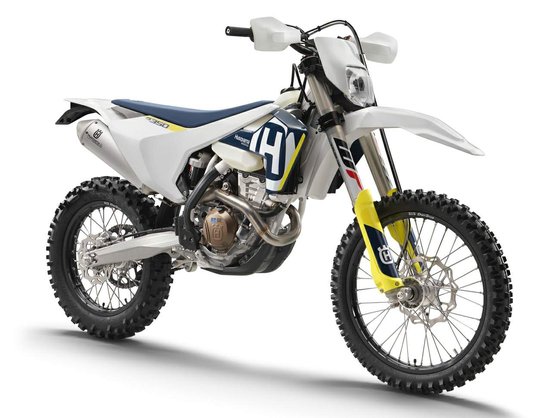
The Husqvarna FE 350 [2019–2020] isn’t just a bridge between 250s and 450s—it’s a destination. It rewards skilled riders with pinpoint accuracy yet forgives mistakes with tractable power and compliant suspension. Whether you’re threading through Appalachian singletrack or scrambling over Mojave rock gardens, this bike molds itself to the terrain. And with MOTOPARTS.store’s catalog of upgrades, you can tailor it to be even more—whether that’s a race-ready weapon or a trusty trail companion.
Ride hard. Maintain smarter.
Explore Husqvarna FE 350 parts and performance kits at MOTOPARTS.store.




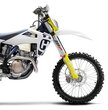

Specifications sheet
| Engine | |
|---|---|
| Stroke: | Four-stroke |
| Starter: | Electric |
| Max power: | 33 kW | 44.0 hp |
| Fuel system: | Keihin electronic fuel injection, 42mm throttle body |
| Lubrication: | Forced oil lubrication with 2 Eaton pumps |
| Max power @: | 8800 rpm |
| Displacement: | 350 ccm |
| Bore x Stroke: | 88 x 57.5 mm (3.5 x 2.3 in) |
| Configuration: | Single |
| Cooling system: | Liquid cooling |
| Compression ratio: | 13.5:1 |
| Number of cylinders: | 1 |
| Valves per cylinder: | 4 |
| Dimensions | |
|---|---|
| Wheelbase: | 1482 mm (58.3 in) |
| Dry weight: | 107 |
| Seat height: | 950 mm (37.4 in) [2019: 970 mm / 38.2 in] |
| Ground clearance: | 360 mm (14.1 in) [2019: 370 mm / 14.5 in] |
| Fuel tank capacity: | 8.5 L (2.25 US gal) |
| Drivetrain | |
|---|---|
| Clutch: | Wet, DDS multi-disc clutch, Magura hydraulics |
| Final drive: | chain |
| Transmission: | 6-speed, claw shifted |
| Rear sprocket: | 52 |
| Front sprocket: | 14 |
| Primary drive ratio: | 24:73 |
| Secondary drive ratio: | 14:52 (13:52 optional) |
| Electronics | |
|---|---|
| EMS: | Keihin EMS |
| Traction control: | Standard |
| Handlebar map switch: | Standard |
| Maintenance | |
|---|---|
| Coolant: | Water-based |
| Rear tire: | 140/80-18 |
| Chain type: | X-Ring 5/8 x 1/4 in |
| Engine oil: | 10W40 |
| Front tire: | 90/90-21 |
| Brake fluid: | DOT 4 |
| Spark plugs: | NGK CR8EIX (2020 models) |
| Valve clearance check interval: | 135 operating hours |
| Additional Features | |
|---|---|
| Exhaust: | Aluminum silencer with optimized flow |
| Subframe: | Carbon composite (250g lighter than previous) |
| Triple clamps: | CNC-machined, 22mm offset |
| Air filter access: | Tool-less design |
| Chassis and Suspension | |
|---|---|
| Frame: | 25CrMo4 steel central-tube frame |
| Rear brakes: | Single 220 mm disc, Magura 1-piston caliper |
| Front brakes: | Single 260 mm disc, Magura 2-piston caliper |
| Rear suspension: | WP XACT Monoshock with linkage, 300 mm (11.8 in) travel (2019: 330 mm / 13.0 in) |
| Front suspension: | 48 mm WP Xplor USD fork, preload adjustable, 300 mm (11.8 in) travel |
| Steering head angle: | 63.5° |



